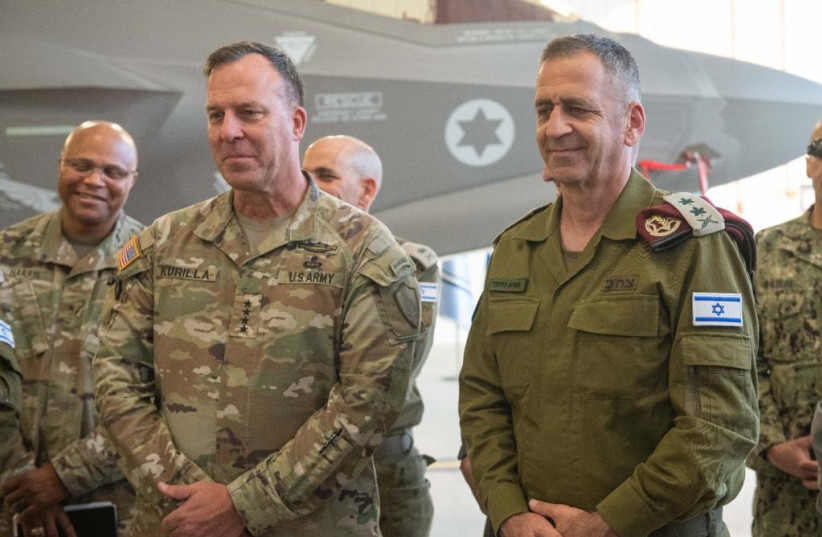IDF Chief of Staff Lt.-Gen. Aviv Kohavi returned to Israel on Thursday from the United States, where he paid a farewell visit ahead of his retirement in January when he will be replaced by his former deputy, Maj.-Gen. Herzi Halevi.
During the trip, Kohavi visited the US Navy Fleet Forces Command headquarters in Norfolk, Virginia, accompanied by its commander Adm. Daryl Caudle. He toured a nuclear submarine and an aircraft carrier to deepen his understanding of their operational capabilities.
On Tuesday, he participated in a situational assessment at US Central Command headquarters in Tampa and held work meetings with CENTCOM Commander Gen. Michael Kurilla.
The highlight was a ceremony with his American counterpart, Chairman of the Joint Chiefs of Staff Gen. Mark Milley, during which the US general awarded Kohavi the Legion of Merit for “deepening the strategic partnership between Israel and the US.”
“Kohavi exemplified the spirit of collaboration and cooperation in furthering the strategic partnership of the United States and the State of Israel,” the text of the award read. “Kohavi solidified Israel’s status as a capable and effective regional security leader in the Middle East. Kohavi clearly established and shared Israel’s strategic defense objectives, in close alignment with US national interests and strategic objectives.”

It was a trip that once again illustrated the ironclad alliance between Israel and the United States, especially when it comes to military cooperation. It is no secret that the two militaries share intelligence and technology, jointly train together and even coordinate various operations throughout the region. Contrary to what some Israel detractors would have you believe, it is also a relationship that goes both ways.
It is well known that the US provides Israel with billions of dollars that the IDF uses to purchase advanced fighter jets, helicopters and missiles. What is less spoken about is the intelligence and operational experience Israel shares with the Americans. No better example of this was 15 years ago when the Israeli government discovered the existence of a nuclear reactor in Syria and brought the intelligence to the White House. Another recent example was when Israel helped collect the intelligence that led to the American targeted killing of top Iranian general Qasem Soleimani in 2020.
Overall, Kohavi has done a good job as chief of staff. He has overseen the restructuring of the IDF, the training of its forces, a number of operations in the Gaza Strip and continued action against Iranian entrenchment in Syria.
Where could Kohavi have improved?
What he could have done differently though is the way he interacted with the public. Like his predecessor Gadi Eisenkot – a new member of Knesset – Kohavi refused for most of his tenure to be interviewed and never held a press conference. He gave only a handful of sit-down interviews which were carefully choreographed and planned with limited questions.
On the one hand, there were many Israelis who were happy with this. In the past, when IDF generals spoke, they were criticized when operations later failed for focusing on their image and not on their missions. On the other hand, Kohavi took this too far.
The IDF is a military that consists of mandatory conscripts. While everyone does not serve, they are supposed to – and many do. These soldiers and their families deserve to know what the IDF chief is planning, what he thinks about the threats and challenges facing Israel, what his position is on the conditions soldiers have at their bases and more.
An IDF chief of staff works for the people and needs to be held accountable by them. There needs to be oversight and refusing to speak or take questions is not taking responsibility. That is unfortunate.
All Kohavi had to do during his trip was ask Milley how he manages the media. Just last week, the US general gave a press conference and the week before that he sat down for an interview with NBC.
Milley does so because he understands that speaking to the public and taking questions is part of his job. He answers to the American public; Kohavi answers to the Israeli public. We hope that his replacement Halevi understands that.
